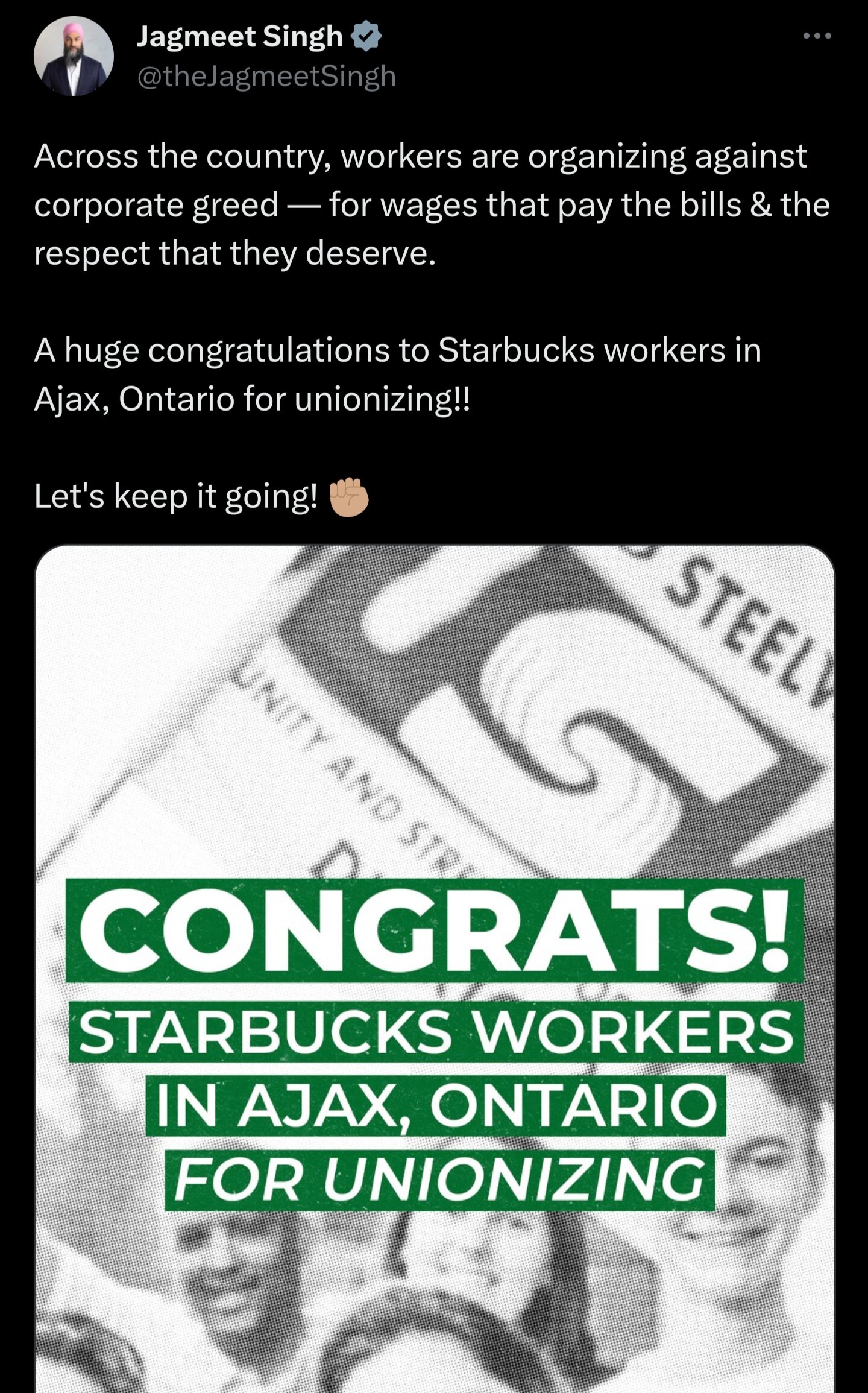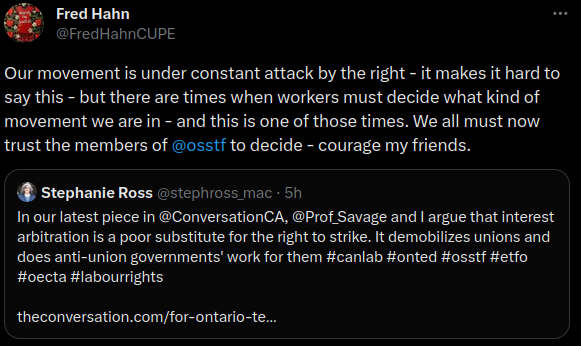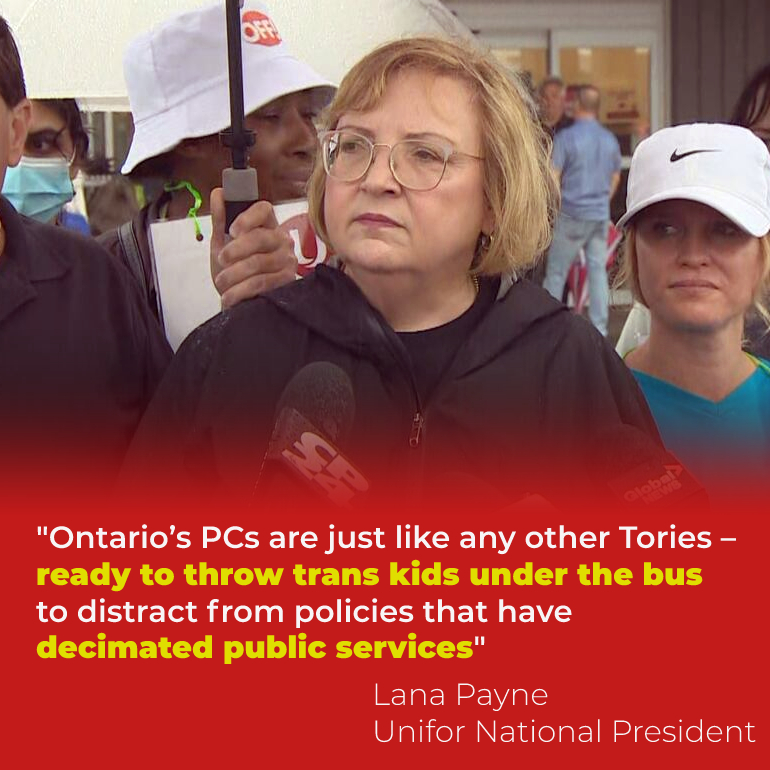None of the unionized Starbucks locations in Canada shut down after their union drive, although I get your concern, corporate can be sneaky!
Doesn't seem like enough to me, although he's had success with these small asks (he got the GST credit doubled a few times now)
They actually managed to pull it off! They got roughly 20% over the life of the agreement, a $4.50 increase for their highest earning employees (full time and senior part time workers, who make $20 per hour currently) and 3.20 for their lowest earning employees (who make about minimum wage). And the best part about it is that nearly half of that increase is in the first year, front loaded. An actually decent deal! More details below.
This meme was based on a true story
I disagree that users really have any say in the direction of the platform. Users aren't clambering for ads or for crappy Amazon products, and so I don't think it's the competing interests of users that drive these changes. I see it as more of a conflict between users and owners.
- Platform begins with small user base
- Investors pour in capital to support and encourage the growth of the user base. At this stage the platform runs at a massive loss. This is when times are good for users.
- Investors, now with substantial influence, seek a return on investment by encouraging new anti-features on the platform.
Maybe this sounds like the same thing, but there are different solutions. If I understand you right, your solution to this problem is to restrict growth, which could allow for a more unified community that could push back against these changes. I would argue to change the incentives, change the governance model, so that the platform is publicly administered or administered by a non-profit or cooperative that is accountable to users, not shareholders. See how this very website (lemmy.ca) is being incorporated as a non-profit. It's pretty neat!
These platforms are getting worse because of monetization.
Corey Doctorow wrote a great piece on the "Enshittification" of TikTok that applies in general to social media platforms as a whole
Vacancy control is a policy that would fix this, and has been proposed by the Ontario NDP! It would tie rents to units instead of tenants, which would mean landlords can't raise rents beyond the rent control guideline when putting a unit back on the market. This removes the incentive for landlords to renovict tenants.
Betting the farm on the private-sector to solve the housing crisis is never going to work - and that's the approach we've tried (and failed) to take
Here's the bitter reality. The houses we're building are large, detached, single family homes. Our municipalities are subsidizing sprawl by banning dense housing and waiving development charges on new suburbs - even though suburban homes are more expensive to serve with utilities, public transit, policing, and healthcare. That's where the public money is going - not to more homes, but subsidizing suburban living. Provincial governments have been unanimously onboard with this scheme, and Ontario's provincial government has just engaged in a nakedly corrupt scheme to enrich developers with over 8 billion dollars worth of Greenbelt land swaps. The federal government has defunded public housing projects for the past 30 years.
Simply saying "we don't have enough builders" ignores the decades of policy failure, and is an easy way to throw in the towel. But the fact is, we can allocate our existing resources better.
The fact is, the NDP and conservatives lost the last election. The NDP won 25 seats. And polling right now shows that the conservatives are going to win the next election if it were called tomorrow.
In the last parliament, from 2019-2021, there was also a Liberal minority, with deal between any party. But the Liberals simply got what they wanted because they could count on the support of either the Bloc (when shooting down legislation over jurisdiction), the NDP (for childcare), or the Conservatives (when legislating workers back to work), and have a working majority.
So, the NDP has three options:
- Have little influence and get played like they did from 2019-2021
- Bring down the government, with a high chance of a conservative majority: which would mean tax cuts for the rich, cuts to healthcare, and giant cash handouts to the private-sector for housing that will enrich developers and effectively scam the taxpayer - I mean, just look at Ford's absolutely transparent greenbelt corruption
- Use their power to broker a deal with the Liberals, guaranteeing them stability in exchange for serious concessions on healthcare (dental care and pharmacare), worker's rights (paid sick days, anti-scab legislation), climate (phasing out fossil fuel subsidies), childcare (ensuring that care is done by public and non-profit instead of private providers), and housing (a few extra billion dollars, which is wildly insufficient IMO)
Option 3 is probably the best deal. Would an NDP government do more to tackle the housing crisis? Yes, but in the current parliament, with only 25 seats, you get what you can get. I think the NDP should push for more, be more aggressive, and have a more credible threat of pulling the plug in order to extract more from the Liberals, and for that reason, I'm not super excited about the way things are going. I'll certainly push for more at the party convention.
However, let's look at the bigger picture. What policy goals have the other parties (including the conservatives) actually accomplished in Parliament over the past decade? They've made a bunch of noise, but gotten pretty much nothing done.
We need a massive, WW2-style investment in home construction, and we need housing prices to go down. That's something that the NDP believes in more than any other party. Take a look at this response in the last leader's debate, where Singh actually pushes back on the notion that housing should be an investment and prices should keep going up. You think Poilievre or Trudeau are going to say anything like that?
The fact is though, that REITs are buying up massive amounts of property, have perverse tax incentives, and have a lot of political influence through their accumulation of capital over the past decades.
Also, hundreds of thousands of dollars funneled into right-wing orgs like Ontario Proud comes from real estate developers. They love to get their people into office!
https://www.cbc.ca/news/canada/toronto/ontario-proud-election-advertising-spending-1.4941210






The firm is called municipal solutions: https://www.municipalsolutions.ca/our-team
The guy in charge of municipal solutions is John Mutton, who has been implicated in this scandal by the Toronto Star's investigative journalism: https://www.thestar.com/news/investigations/who-is-mr-x-after-scathing-ethics-probe-raises-questionable-conduct-of-unnamed-greenbelt-consultant/article_d34f22b7-2a19-5e0f-b0fb-cc786bdb4b2f.html